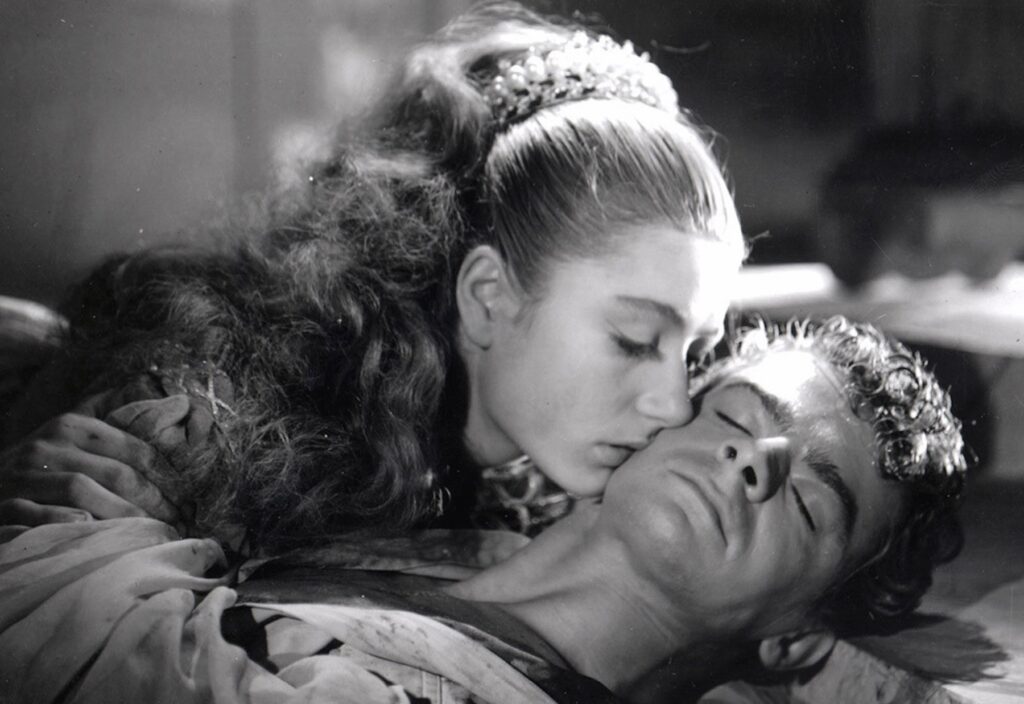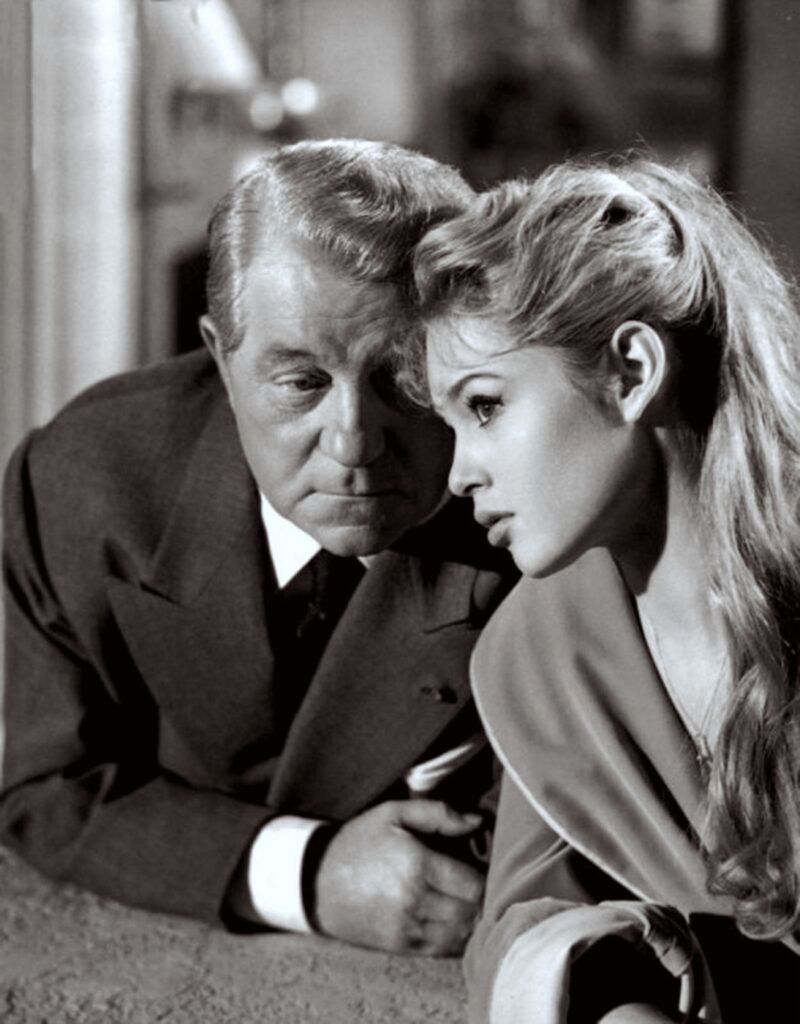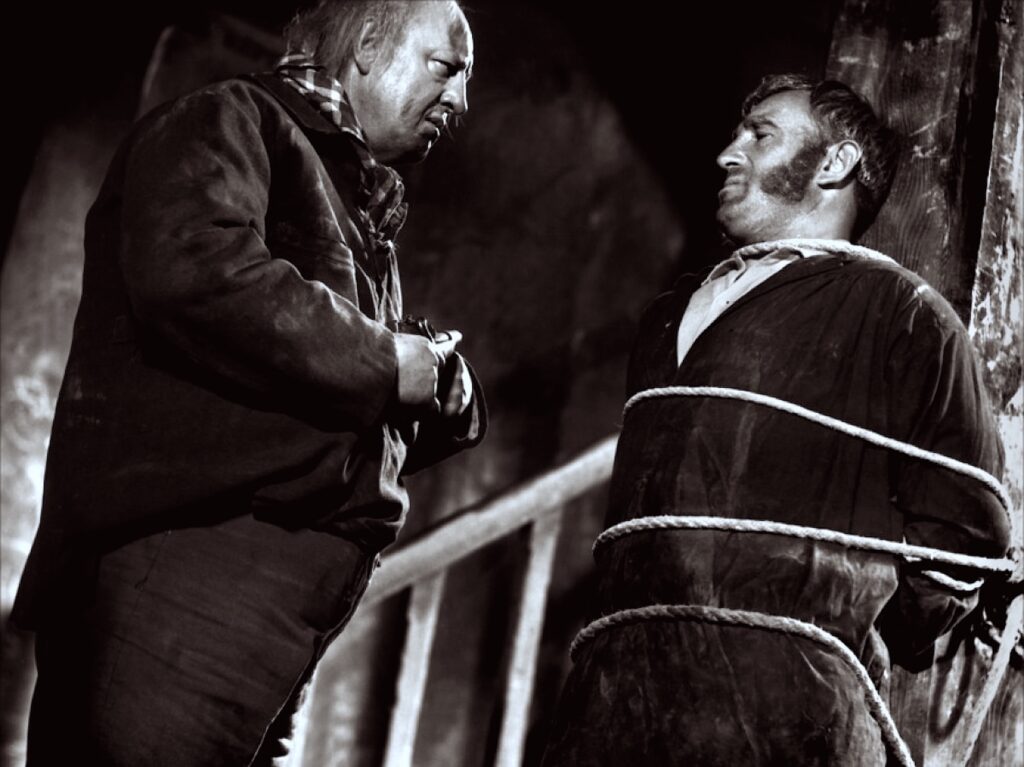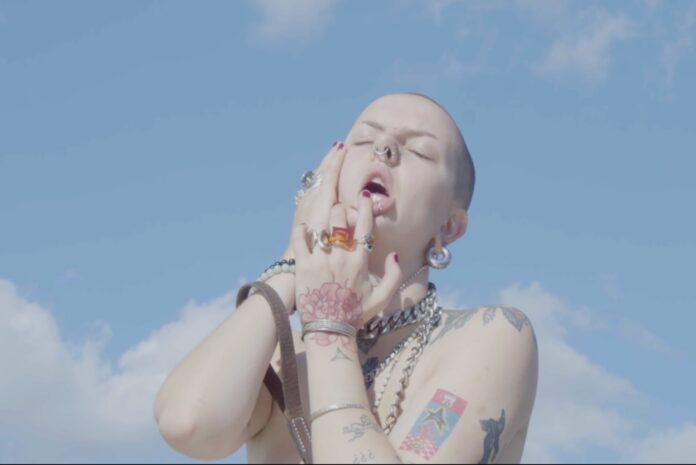The local fall film festival season kicks into high gear this week, with no less than three such events (plus one major series) commencing. Two are custom-made for hedonists. There’s the Drunken Film Festival (more info here), which for the first time will open with an event in San Francisco: Liza Mandelup’s documentary Caterpillar, about a curious intersection between questionable medical science and the pursuit of happiness, showing at the Balboa. The next evening it crosses the Bay to Oakland’s New Parkway for another feature, satirical mockdoc My Imaginary Life for Someone from festival alumni Ryan McGlade and Molly Wurwand. The remaining nights (though Fri/11) revert to form, offering free programs of diverse shorts at a lineup of Oakland bars. Needless to say, alcohol will be available at all venues during the schedule.
Another kind of high is on tap at the HUMP! Film Festival, the second part of whose 2024 programming (the first was last spring) returns Fri/4-Sat/12 to SF’s Victoria Theater—an historic venue that’s been so quiet film-wise lately, we’re glad to hear it’s still open. This is Dan Savage’s long-running showcase for amateur porn from around the world, generally of a nature considerably more imaginative/artistic/humorous than the kind you’ll find on PornHub. Further details were not readily available, but ticket and schedule info is here.
A comparatively sober and chaste affair is the Mill Valley Film Festival, which in its 47th edition is more than ever a very long advance red-carpet path to the Oscars. It opens this Thurs/3 with one such likely contender, All Quiet on the Western Front director Edward Berger’s Conclave, with Ralph Fiennes, Stanley Tucci, John Lithgow and Isabella Rossellini playing fictive Vatican insiders locked in a power struggle after a Pope’s death.
Other heavily buzzed-about titles (most of which will open commercially before the year’s end) on tap include Sean Baker’s Cannes prize winner Anora, August Wilson adaptation The Piano Lesson, Marielle Heller’s showcase for an out-there Amy Adams as Nightbitch, stop-motion animation Memoir of a Snail, Robbie Williams biopic Better Man, French “narco trans musical” Emilia Perez, and more. Among the big names expected to attend are Adams, Lesson’s Danielle Deadwyler, Emilia’s Zoe Saldana, and Jude Law, who will get his own tribute evening. Internationally renowned directors also represented include Andrea Arnold (Bird), Pedro Almodovar (The Room Next Door), Steve McQueen (Blitz), Mati Diop (Dahomey), Luca Guadagnino (Queer) and Jason Reitman (Saturday Night).
As ever, though, the majority of the program consists of lesser-sung independent features and shorts, with special sidebars for family entertainment, Latinx content (“Viva al cine!”), “Active Cinema (i.e. activist subject matter), female and nonbinary filmmakers (“Mind the Gap,” which includes a free networking summit on Sat/5), and of course MVFF’s usual surfeit of music-themed material. The latter include movies about Billy Preston (That’s The Way God Planned It), plus of course venerable audiovisual mixtape The Hi Di Ho Show.
Several celebrated Bay Area documentarians have new work in MVFF: Connie Field’s Democracy Noir is a sweeping on-the-ground view of authoritarianism taking over Hungary, Allie Light’s The Ship That Turned Back recalls late husband/collaborator Irving Saraf’s childhood flight from the Nazis, and Jeanne C. Finley’s Red Boat Crossing memorializes her own mother’s heroic WW2 Red Cross service. Also of particular local interest is Lost in Time: Druid Heights, about the “hidden bohemian paradise” near Muir Woods that was home or host to generations of countercultural creatives over the decades, from Alan Watts and James Broughton to Neil Young and porn star Desiree Cousteau. Other nonfiction features run a gamut from the political (Borderland, Homegrown, Zurawski v Texas) and environmental (buffalo-centric Bring Them Home, Fools’ Paradise, Mollie’s Pack, Oceania) to gender issues (The Legend In Me, The Day Iceland Stood Still), just for starters.
The above is just an iceberg-tip overview. For full program, schedule and ticket info on the Mill Valley Film Festival, running Oct. 3-13 at various Marin County venues (as well as BAMPFA in Berkeley), go here.

In a different mode, the Roxie is again playing host this week to Midcentury Productions’ “The French Had a Name For It” series, whose monicker refers to the term Gallic critics came up with for the cycle of US crime dramas that flourished post-WW2. Their own filmmakers also made films roughly in that idiom, and programmer Don Malcolm’s selections have always viewed “noir” as a broad umbrella that can include movies made outside the genre’s traditional timeframe, or with only a tangential overlap in terms of style or subject matter. Many of the films thus showcased hadn’t been screened in the U.S. for long years, if ever.
The current installment, running this Thurs/3-Sun/6, is billed as the penultimate—the final one is scheduled to start Nov. 30, when presumably Malcolm’s long-aborning book on this general celluloid terrain will finally have been published. Opening night provides a double bill of two among the many, many adaptations of stories by incredibly prolific Belgian mystery writer Georges Simenon. Neither of these involve his most famous creation, Inspector Maigret.
Claude Autant-Lara’s 1958 Love Is My Profession was more notable for providing a torch-passing first and last intersection between two legendary stars: Brigitte Bardot, who’d just become an international sex symbol via Roger Vadim’s And God Created Woman, plays a “girl on the game” defended in court by much older barrister Jean Gabin. That affiliation naturally leads to intergenerational hanky-panky, though between “Bebe’s” usual repertoire of pouty wriggling and Gabin’s latterday stoneface, sparks do not exactly fly—it’s more a faceoff between conflicting acting styles/personas than a love match. One of Simenon’s most acclaimed novels was the basis for Luis Saslavsky’s 1954 La neige etait sale aka The Snow Was Black, which has the estimable Daniel Gelin as a man plunging into deliberate, sordid self-destruction during the Nazi occupation.
Friday evening rewinds a couple decades to spotlight early French works by directors who would go on to make some of the all-time-greatest noirs during later Hollywood sojourns. Fourteen years before he did The Killers with Burt Lancaster and Ava Gardner, Robert Siodmak cast a young Charles Boyer as a newly freed convict who soon gets into fresh trouble in 1932’s Tumultes—which was made back-to-back with a German-language version starring Emil Jannings. (We’ll take Boyer any day.) And 12 years before son Jacques crafted Out of the Past, Jacques Tourneur (whose own significant stint in the US film industry was during the silent era) painted another viper’s nest of criminal intrigue in Justin de Marseille.

Sat/5 is given over to no less than five films by Andre Cayatte, a writer and director whose career spanned six decades, but whose reputation suffered (like that of many peers) amidst “out with the old, in with the new” sentiments trumpeted by the Nouvelle Vague. Opportunity for fresh appreciation is provided by screenings of his 1940 Tempete aka Thunder Over Paris (which was shot just before the declaration of war), 1946’s Le dernier sou aka The Last Penny (which by contrast was shot during occupation, then released after war’s end), 1948’s Les dessous des cartes aka Under the Cards, and the 1954 Avant le deluge.
These were all crime melodramas of one sort or another—the latter with the novel twist of reflecting teens’ fear of mass destruction in the “atomic age”—but the day’s programming ends in a different vein with what is often considered Cayatte’s masterpiece. The Lovers of Verona (1949) is a complexly layered construct with future international stars Anouk Aimee and Serge Reggiani as youth who fall in love while employed as stand-ins for the self-absorbed leads on a new film version of Romeo and Juliet. Needless to say, life finds a way to imitate tragic art, despite the modern setting. Sophisticated in both its ideas and execution, this is one of the great European movies of the era.
There are double-feature tributes to two immortals of Gallic cinema, Sunday afternoon bringing more Jean Gabin, albeit in the days before his parade of signature roles began in earnest. He’s third-billed in the 1932 walk-on-wild-side crime drama Coeur de lilas aka Lilacs from Russian emigre Anatole Litvak, who’d soon move on to Hollywood. Arguably the actor’s first great movie was Julien Duvivier’s 1936 La belle equipe aka They Were Five, an excellent seriocomedy in which a quintet of unemployed men pool their lottery winnings to open a cafe—a business scheme that starts out in collective high spirits, then gradually disintegrates amidst bad luck and personal conflicts.
Hulking, hangdog-faced Michel Simon (who co-starred with Gabin in the classic 1938 proto-noirPort of Shadows) was already a huge star when he made two cunning melodramas playing Monday night, 1946’s Un ami viendra ce soir… aka A Friend Will Come Tonight and the next year’s Non Coupable aka Not Guilty. The first has Resistance fighters hiding in the plain sight of a mental hospital ward, while the latter has him as a dissolute small-town doctor a little too excited to discover he can get away with murder.

Commencing at 5:30 on Sun/6 is a rare chance to see in a theater what many consider the finest film version of Victor Hugo’s Les Miserables—Raymond Bernard’s 1934 one, whose three feature-length parts add up to nearly five hours. (Even that makes it nowhere near the longest adaptation, which honor goes to a 22.5 hour Japanese TV animation series.) More faithful than most, it charts the familiar tale of ex-con Jean Valjean’s redemption while pursued by ruthlessly vindictive police inspector Javert. The latter was played by Charles Vanel, whose career would continue for another 55 years; the former by Harry Baur, whose own would tragically be cut short when he died after being arrested and tortured by the Nazis in 1943.
Staged on an impressive scale, this Les Miz towers above many later interpretations—not least that awful musical—in myriad respects. Despite the occasional creaky performance note or obvious matte/miniature effect, it’s less dated at 90 than some films made nine years ago. The sweep of events (Part 3 is pretty much one long street battle between revolutionists and National Guard), the stark cruelty of institutionalized injustice and poverty, the gallery of colorful characters et al. are finely etched.
You might ask just what this venerable 19th century epic has to do with noir, but in fact it’s very noir-adjacent: Bernard, cinematographer Jules Kruger and the production designers borrow liberally from the techniques of German Expressionist silent cinema—tilted camera angles, ominous shadows, stylized sets—that would later provide an aesthetic template for much Hollywood noir. A scene in which the terrified young Cosette (Gaby Triquet) braves a dark nighttime forest to draw water from a well is so floridly Gothic, it anticipates Disney’s Snow White.
Full program, schedule and ticket info for the current French Had a Name For It series, running Thu/3 through Mon/7, can be found here.





